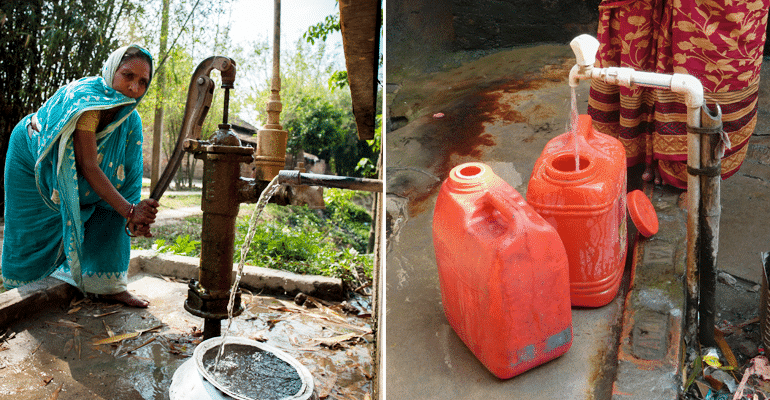This chemical element is colorless, odorless and is no less than a silent killer. The condition is so precarious that it has affected 14 districts in West Bengal and yet people are not aware or sensitive to the dangers of consuming contaminated water.
Life Beyond Numbers spoke to Jaydeep Chakraborty, CEO of Calcutta Rescue about the arsenic toxicity in Bengal and we found out how the CR Arsenic Project is helping 1800+ families by distributing 20,000 liters of safe drinking water.
Calcutta Rescue is the brainchild of Dr. Jack Preger, a British medical doctor who began providing medical care from a street clinic to the poor of Kolkata in 1979. It was April 4, 1991, when the NGO was born.
Arsenic Poisoning in Bengal
Arsenic is a naturally occurring and very toxic substance found in high concentrations in the groundwater, especially around the Ganges delta. Groundwater, being the major source of drinking water for most people in the rural area, high levels of arsenic presence is causing health related issues when consumed over a long period of time.
Constant usage of Arsenic contaminated water often leads to Arsenic Poisoning, which causes skin cancers, skin lesions, internal cancers, hypertension and cardiovascular disease, pulmonary disease, peripheral vascular disease and can also be life-threatening.
“We are trying to address the basic living standards like access to clean water and sanitation and trying to improve lives of the poorest of the poor living in slums in and around Kolkata,” says Chakraborty.
What Calcutta Rescue Arsenic Project does
Apart from focussing on the health programs, education and handicrafts projects, in August 2003, the NGO launched their flagship initiative Calcutta Rescue Arsenic Project to ensure that people in rural areas of West Bengal have access to safe drinking water in some of the worst affected villages and to generate awareness amongst the people on dangers of arsenic poisoning. This pilot water filtration project was started by installing 4 filters and tube wells in Malda.
Till date, the NGO has installed 12 community Arsenic and Iron removal filters along with functioning tube wells at gram panchayats- Bamongram and Mosimpore, Jodupur, Silampur, North Lakhipur, Kaliachak, and Malda.
Today, because of this initiative about 1800 families have access to the filters and electric pumps that has led to an exponential increase in the usage and quality of the water from these filters. Another 8 filters have been added to the existing ones to cater to the ever growing needs of the villagers. The existing filters currently provide over 20,000 liters of uncontaminated drinking water per day.
With the support of local Panchayats (village councils) and local organizations, Calcutta Rescue has trained villagers in the use and maintenance of these units to ensure their long-term sustainability.
Arsenic – A Public Health Hazard
“The areas where we work, the access to clean water is very difficult, we have girls who come to our education center, who spend an hour and a half in the morning going to collect water. As a result, they are late for school and they are unable to get a proper education as a result,” says Jaydeep.
In 50 countries, it is estimated that about 140 million people consume water containing arsenic at levels above the World Health Organization (WHO) guideline, which is 10 mg/liter. Over a period of time, exposure to arsenic can lead to cancer, skin lesions, and even arsenicosis.
Chakraborty mentions that the NGO has a very strong arsenic removal project in Malda as the toxic substance is found across Asia, predominantly in Bengal and Bangladesh. In fact, Bengal has the highest level of arsenic present in groundwater than any other states in the country. “Because arsenic is colorless and cannot be smelt, people consuming arsenic, do not realize, they are drinking poisonous water,” he says.
“The government has also installed 680 filters across Malda district of WB at the cost of over 80 crores but unfortunately the maintenance of the filters are not happening,” says Jaydeep. “So many of these filters now lie defunct and sadly, the villagers are not able to access these filters.”
Further, he tells LBN that “the filters installed by the NGO are operational for almost 14 years now. So, Calcutta Rescue is trying hard to have a dialogue with the government, to ask them whether we can take over the maintenance of these filters, which require periodic, monthly care so that many more villagers can get access to clean drinking water.”
Born in London, Jaydeep started his career as an aerospace engineer followed by automotive engineering and worked for British Aerospace in England and Lear Motors in Germany. He has co-founded Wings Learning Centres, a chain of affordable education centers for low-income communities. He joined Calcutta Rescue as CEO in 2017.



